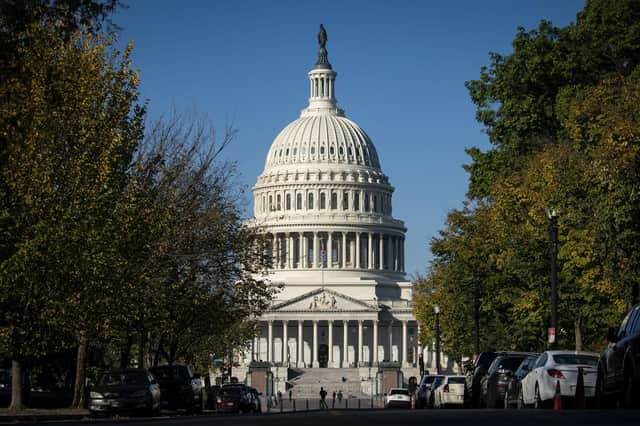US election 'too close to call' between Donald Trump and Joe Biden as world awaits results from battleground states


A late burst of votes in Michigan and Wisconsin gave Joe Biden a small lead in those states, but it was too early to call the races. Hundreds of thousands of votes are also outstanding in Pennsylvania.
The two candidates, who have proposed dramatically different visions for the nation, split territory across the US after polls closed on Tuesday night. With neither candidate securing the 270 electoral college votes needed to win the White House, Mr Biden urged patience and vowed that every vote would be counted.
Advertisement
Hide AdAdvertisement
Hide AdBut Mr Trump, in an extraordinary move from the White House, called for outstanding ballots not to be counted.
The Republican president made premature claims of victories in several key states and said he would take the election to the Supreme Court to stop the counting. It was unclear exactly what legal action he might try to pursue.
Vote tabulations routinely continue beyond election day, and states largely set the rules for when the count has to end.
Several states allow mailed-in votes to be accepted after election day as long as they are postmarked by Tuesday. They include Pennsylvania, where ballots postmarked by November 3 can be accepted if they arrive up to three days after the election.
Advertisement
Hide AdAdvertisement
Hide AdMr Trump suggested those ballots should not be counted, but Democratic challenger Mr Biden, briefly appearing in front of supporters in Delaware, urged patience, saying the election "ain't over until every vote is counted, every ballot is counted".
"It's not my place or Donald Trump's place to declare who's won this election," he said. "That's the decision of the American people."
Pennsylvania governor Tom Wolf tweeted that his state had more than a million ballots to be counted, and said officials "promised Pennsylvanians that we would count every vote and that's what we're going to do".
Democrats typically outperform Republicans in mail voting, while the Republicans look to make up ground in election day turnout. That means the early margins between the candidates could be influenced by which type of votes - early or election day - being reported by the states.
Advertisement
Hide AdAdvertisement
Hide AdThroughout the campaign, Mr Trump cast doubt on the integrity of the election and repeatedly suggested that mail-in ballots should not be counted. Both campaigns have teams of lawyers at the ready to move into battleground states if there are legal challenges.
The tight overall contest reflects a deeply polarised nation struggling to respond to the worst health crisis in more than a century, with millions of lost jobs, and a reckoning on racial injustice.
Mr Trump kept several states, including Texas, Iowa and Ohio, where Mr Biden had made a strong play in the final stages of the campaign, but the Democrat also picked off states where the president sought to compete, including New Hampshire and Minnesota.
Florida was the biggest and most fiercely contested battleground on the map, with both campaigns battling over the 29 electoral college votes that went to Mr Trump.
Advertisement
Hide AdAdvertisement
Hide AdWisconsin, which he narrowly won in 2016, is another prized state, and the president seems certain to request a recount. State law allows for the apparent losing candidate to pay for a recount if the margin of defeat is less than 1%.